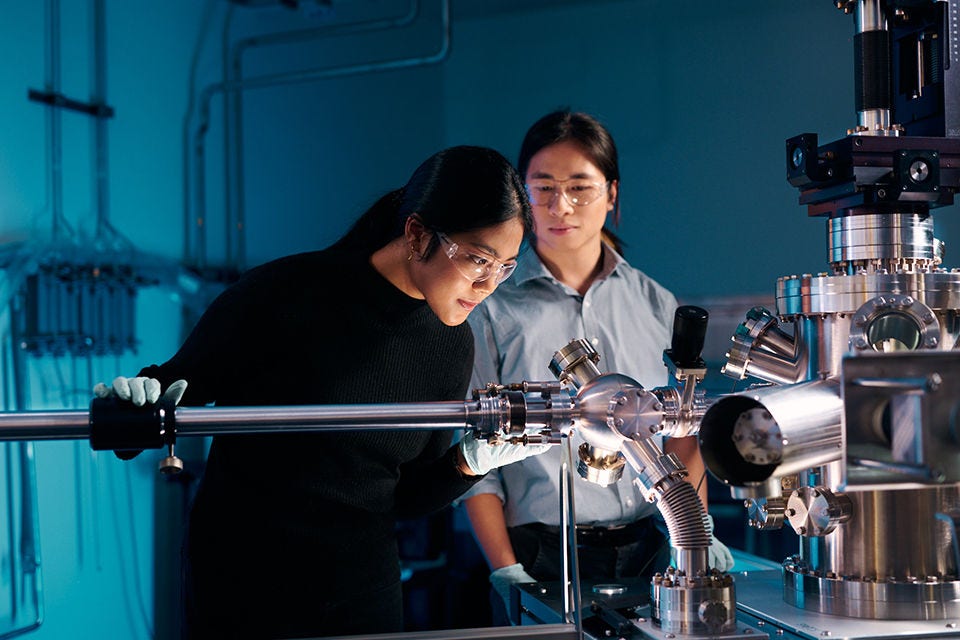Why Australia?
Collaboration is key
Australia recognises the value of teamwork. Major global partnerships are producing groundbreaking research, and teams are making progress on solutions to some of the critical issues of our time. Australian universities have more than 9,000 formal agreements with overseas universities to foster collaboration while you study. You will be encouraged to work on collaborative projects.
Thinking outside the box
Australia’s approach to teaching goes far beyond learning the theory. Your studies will involve opportunities for hands-on, practical learning; experimentation and discovery; exploring your ideas; and finding innovative solutions to old and new challenges we face.
A head start for your global future
In Australia, major global corporations are closely connected with higher education providers. To give students a head start in industry, they offer student internships, mentorships, scholarships, research partnerships and project funding. You could find yourself working with a major global player, like Boeing, Oracle or Exxon, sooner than you thought.
Study options
Learn to understand different parts of life, from the inner workings of the body to the world and the universe we live in.
With a science or maths qualification, you’ll build skills to investigate almost anything through experiments, observation and theory. As you develop your knowhow, you will be able to help solve new and increasingly complex challenges that we face in our lives. These skills are especially important in STEM (science, technology, engineering, mathematics) fields, but are highly valued in many different areas – even sports and zoology.
Your studies will also help you build critical problem-solving, analytical thinking and people skills. These will make you a strong candidate for roles in many fields.
Depending on what you study, you might build your knowledge in:
- atmospheric sciences
- biological processes
- chemical reactions
- geological composition and structures
- laboratory methods
- mathematical and statistical techniques
- observation and measurement
- scientific methods
- subatomic particles and quantum mechanics
- thermodynamics and entropy.
Science or mathematics could be a great choice for you if you have a curious mind, enjoy working through step-by-step processes to find solutions, and want a high-earning career that will be valued for many years into the future.
Fast facts
Quality education
7 Australian universities are ranked in the world’s top 50 for Earth and Marine Sciences. (Source: QS World University Rankings by Subject 2024).
Increased earning opportunities
People with qualifications in STEM earn more than those with non-STEM qualifications.
An in-demand skillset
By 2030, workers in Australia will spend 77 per cent more of their time using science and mathematics skills.
Career options
In a world driven by technological change and endless data, the future workforce needs more and more people with advanced science and mathematics skills. People with advanced STEM knowhow are in demand, and Australian qualifications in science and maths are recognised and accepted in industries across the world.
Graduates from these courses often follow careers in the area they studied, with many working in scientific labs or in research facilities. Others use their knowledge in other industries too. They work across education, business and finance, government, law, health and medicine, sports, engineering, computing and technology, building and construction, and many others.
What these people have in common is that they are often involved in teams that make discoveries, contribute to important research, make breakthroughs in developing new products and tools, and use their insights to bring positive changes to our lives.
Science and maths can open a huge range of career options, so you will have opportunities to choose the right fit for you. Your skills could position you at the cutting edge of discovery and development, where you could change the future.
About the industries
Science and mathematics in Australia are driving important discoveries and innovations – like new ways of producing renewable energy for the world. This is making Australia a strong player in the global STEM industries, and Australia is collaborating on more projects with different countries. Companies and government agencies are investing more in these areas, and are likely to keep investing into the future.
These industries are growing, and science and mathematics graduates can look forward to positive career outcomes, based on what we already know about the workforce:
- More than two million people in Australia’s workforce have STEM qualifications, and many people in these fields come from across the world.
- The most common career fields for science graduates are health care and social assistance, and education and training. People qualified in science are most likely to work as technicians or trades workers, or in professional roles.
- People with mathematics qualifications most often work in professional, scientific and technical services, as well as education and training. They mostly work in professional roles, or as managers.
- Most people with science or maths qualifications earn between A$41,600 to $104,000, but many professionals earn more than A$104,000 each year.
Find out more about jobs and salaries.
Jobs in demand
Demand for people with science and maths qualifications is increasing as we rely more on advances in technology and digitisation. It’s expected that between 2021 and 2026, there will be an increase in the following roles:
- research and development managers – 23.8% (4,100) more jobs
- medical technicians – 20.7% (7,300) more jobs
- actuaries, mathematicians and statisticians – 11% (1,800) more jobs
- science technicians – 6.8% (1,400) more jobs.



